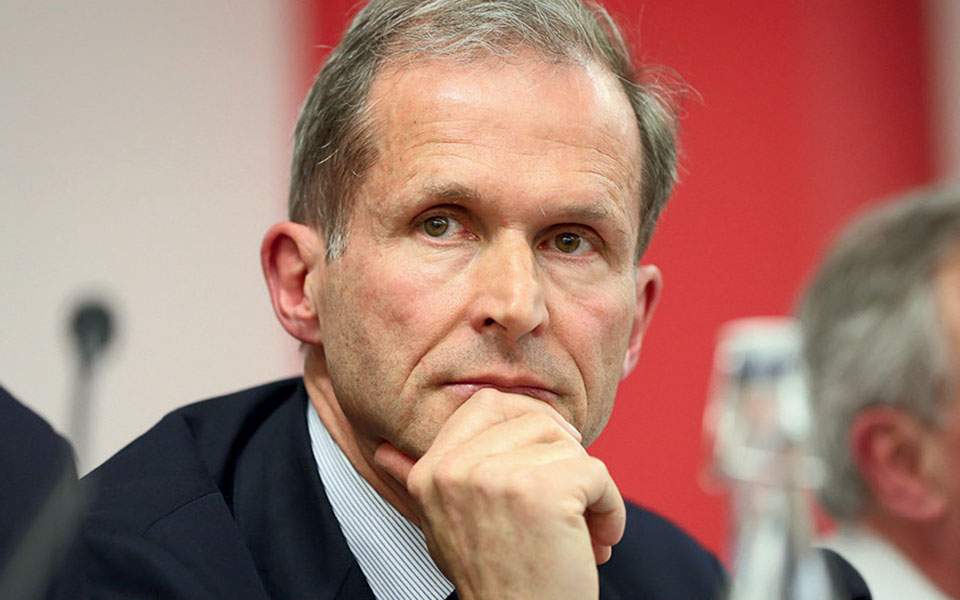‘Europe again will find its way,’ economist Erik Berglof tells Kathimerini

Is the coronavirus the last chance for us to bring about fundamental changes in the world, or will the taming of the pandemic give our apparently expired economic model a new lease of life?
Professor Erik Berglof is director of the Institute of Global Affairs at the the London School of Economics, a senior fellow at the Washington-based Brookings Institution, and a member of the “wise persons group” (WPG) currently reviewing the European Union’s development finance architecture. In an interview with Kathimerini, the Swedish economist offers some rather bold answers.
Is this the end of globalization as we know it? Is the decoupling of the United States and Europe from China expected to accelerate, or will the coronavirus act as catalyst for global cooperation, leading to a more stable, sustainable and environmentally aware globalization?
I have found that I am systemically too optimistic in areas where I am deeply engaged, and I believe deeply in global cooperation and finding ways of deepening the legitimacy of global institutions. Yet there are many reasons to be pessimistic. The gulf between China and the US/Europe certainly predates the Covid-19 virus – it has been widening and deepening for several years – but the pandemic has certainly accelerated the process. In the technology space it is already a fact, but decoupling is certainly moving into trade and investment. While global value chains have become increasingly Chinese over the last two decades, multinational corporations are reviewing their value chains. They are likely to onshore more and seek alternative suppliers to those located in China, but China will also seek to control more and more value chains, and is investing heavily in technologies, like AI, which are going to shape value chains in the future.
One big concern is that decoupling is now reaching education and academic research, where the world has benefited tremendously from the entry of China into the world economy. So while I am still hopeful that the world will come together, like it did after WWII and the Great Depression, and shape a new global architecture, there are many important structural forces pulling us apart.
The deepest and most difficult challenge is the clash between China’s authoritarian approach to government and the liberal democracies that have underpinned the global system to date.
Are we witnessing the slow unraveling of the eurozone as we know it? Alternatively, do you anticipate some kind of debt unification so to ensure overall European debt sustainability when the coronavirus recession and gaping annual deficits cause huge strain and significant downgrades across all European debt markets?
What I said about bias in judgment being colored by your personal preferences and experience applies also here. I believe strongly in the European Union and the achievements it has brought on the European continent. The eurozone is an important but still incomplete part of that project, and it will come under unprecedented pressures as the fallout from the pandemic becomes clearer. Yet I am still optimistic that Europe will again find its way around these difficulties. In the wake of Covid-19 we will have to learn to live with much higher debt levels in governments as well as in the corporate and household sectors. Future generations will have to service those debts and eventually bring them down. Many countries have shown that this is possible, but it will require adjustments of expectations.
Do you expect political upheaval? Do you think China’s recession will test the stability of the Communist Party? Conversely, how difficult will it be for Western democracies, not yet recovered from the austerity which ensued after the 2008 crisis, to withstand the impact of this new recession?
Political repercussions are unavoidable, but they might not show up immediately. We saw in the global financial crisis that there was a lag of five to seven years before we saw major changes in the political space. For better or for worse, China’s political system has proven remarkably resilient, and the Party, if anything, has dramatically strengthened its position over the last decade. Despite major mistakes in the early weeks of the epidemic, China can make some claim to actually having managed to bring down the death toll dramatically and giving the rest of the world some more time to prepare – time it didn’t use very well. No doubt, many Western democracies were weakened by the global financial crisis, and they will struggle to mobilize a response at the level currently being implemented in countries like the US and the UK. Their resilience is likely to be further undermined by rising inequality and political strife in the aftermath of Covid-19.
What kind of new financial development architecture do you support as a leading member of the EU’s “high-level group of wise persons”?
The current Covid-19 pandemic is very much the kind of stress test we had in mind when we were thinking of how the European system of institutions – national, EU-level and global – could become more coherent and more effective. It is clear that in the current crisis Europe does not have the strong EU-level development institutions necessary to help developing economies mount a stronger response the pandemic. I would like to see a strong European Sustainable Development Bank at the center with strong links to national and global development banks and agencies. Ideally, it should have co-ownership by the countries where it operates and non-EU partners, particularly the UK, but ideally also the US. This would the send the signal of how Europe wants to engage, in an inclusive multilateral way.
Do you think we should start planning for organized and managed debt restructuring, at least for some sovereigns, banks and corporations? Is it time for a European “bad bank,” as the European Central Bank seems to support? Greece in particular can no longer follow the strict rules for an annual primary surplus of 3.5% GDP set by creditors to support debt sustainability. Is a new restructuring inevitable?
I have long been in favor of restructuring Greece’s debt, but I understand the difficulties of doing so explicitly. The path chosen of extending it is less elegant, but it achieves much of the same thing. I am sure that there will be more of that. It could also be that – as might have been implicit in your question – the Covid-19 crisis represents an opportune moment to restructure debt globally, and ideally also in Europe. To handle this at the European level, we do need a bad bank.
Would you say that the dual phenomenon of the chronic indebtedness of families, corporations and sovereigns while corporate profits are channeled away to tax havens provides part of the answer for the unexpected fragility and limited resilience of Western economies? Is it time for tax havens to be abolished and for the mobilization of helicopter money to extinguish the flames of new inequality?
The leakage to tax havens has certainly weakened Western governments’ ability to invest in growth-promoting infrastructure and R&D. Some progress has been made in forcing greater transparency in many tax havens, but it will remain incomplete as long as the United States does not comply. Delaware remains arguably the most important tax haven in the world.





